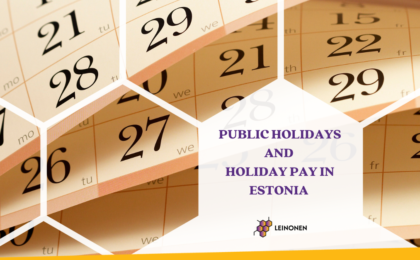In order to support employers who are facing financial difficulties due to COVID-19, a new follow-up remuneration compensation measure will be available as of 1 July 2020.
This notice will give you a brief overview of the new labour market service designed to support employees. If you have any further questions, please contact Leinonen using the contact details below.
The objective of the remuneration compensation as well as the follow-up remuneration compensation measure is to help employers avoid lay-offs and promote continued economic activities. To alleviate the situation of many employers who now find themselves in financial difficulties, and to ensure continued employment and payment of remuneration, an amendment was adopted to regulation No. 130 of 17 November 2016 of the Government of the Republic “Employment Programme 2017-2020”.
Application for remuneration compensation during previous months will not impact the follow-up remuneration compensation, what matters is compliance with the below criteria. However, it should be pointed out that applying for follow-up remuneration compensation requires a valid employment relationship with the employee and the date of commencement of work of the employee must be no later than 1 March 2020. As with the previous remuneration compensation measure, follow-up remuneration compensation will only be paid to natural persons working under an employment contract.
Employers are entitled to apply for the follow-up remuneration compensation from the Estonian Unemployment Insurance Fund if their turnover, or in the case they have no turnover, their revenue or income, in June 2020 is at least 50% smaller than their turnover or income in June 2019
and
the employer meets at least one of the two criteria specified below:
- the employer has implemented § 35 of the Employment Contracts Act and as a result, the working time of the employee is reduced by at least 30% compared to the agreed working time or the employer is unable to provide work to the agreed extent;
- the employer has cut remuneration by at least 30% based on § 37 of the Employment Contracts Act or reduced it to the minimum wage established by the Government of the Republic.
Note! It is important to note here that the employer must have implemented § 35 or § 37 of the Employment Contracts Act, as specified above, for the entire month of June and for at least 50% of their employees. The employer may also implement both measures successively with regards to one employee during the entire month of June.
The Unemployment Insurance Fund pays remuneration compensation to employees in the amount of 50% of their average remuneration but not more than 800 euros (gross) per calendar month. Calculation of the average remuneration of employees follows the unemployment insurance benefit rules applicable to lay-offs provided in the Unemployment Insurance Act. The employer pays the employee at least 150 euros (gross). The combined payment by the Unemployment Insurance Fund and the employer must amount at least to the minimum remuneration rate compliant with the working time of the employee. Employees are entitled to receive the follow-up remuneration compensation for June 2020.
The employer must submit an application to the Unemployment Insurance Fund for the follow-up remuneration compensation for each calendar month after paying remuneration to employees, generally within five business days. The option to apply for follow-up remuneration compensation is available to employers in e-töötukassa (online service platform of the Unemployment Insurance Fund) as of July 2020.
A ban on lay-offs applies during the payment of follow-up remuneration compensation just as it did with the remuneration compensation procedure. This ban means that employers are required to return the follow-up compensation to the Unemployment Insurance Fund in full if they lay off (incl. deliver a notice of dismissal) the employee for whom follow-up compensation was applied. This ban applies to the month of June, for which follow-up compensation was applied, as well as to the following two months.



